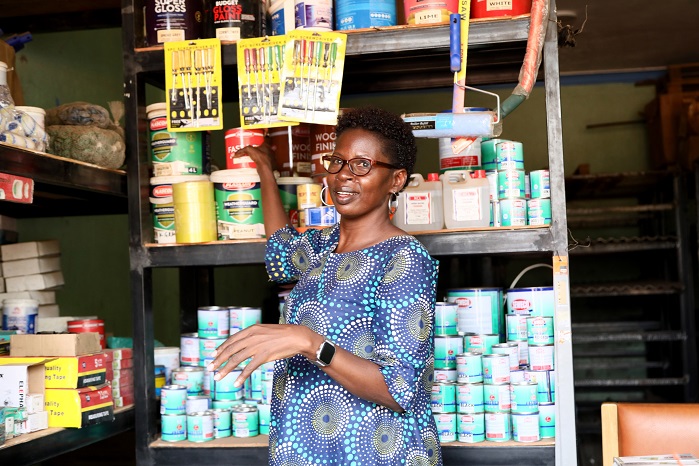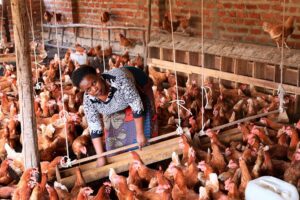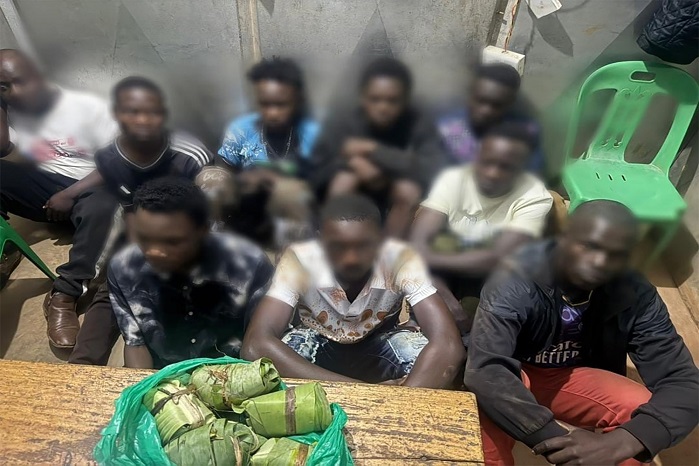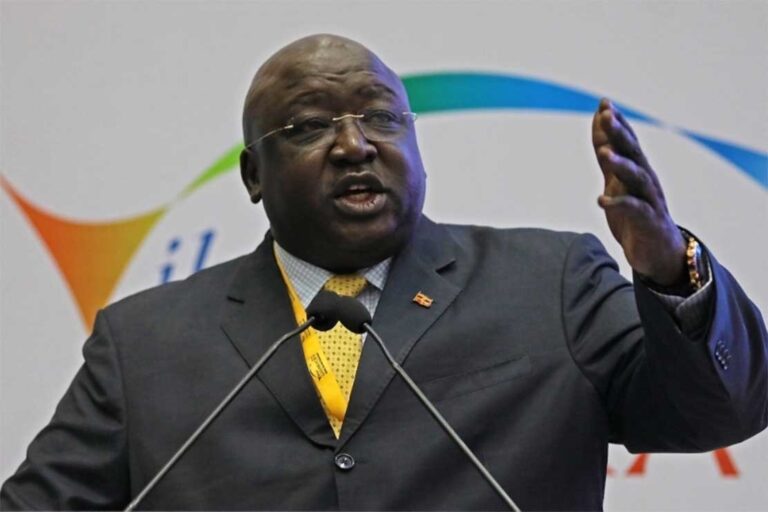
Rebecca Apio, 39, a lawyer and proprietor of Nyer Ni Mit General Hardware on Lira-Soroti Road, Lira City had business recapitalised with GROW loan
HABARI DAILY I Kampala, Uganda I Women are smiling all the way to the bank. Recent reports have revealed that up to 2,175 women entrepreneurs from 86 districts and 3 cities around Uganda have so far accessed up to sh50b loans under the Generating Growth Opportunities and Productivity for Women Enterprises (GROW) project.
The project, which is being financed with a $217 million grant from the International Development Association of the World Bank became effective on 20th January 2023, with the Ministry of Gender Labor and Social Development (MGLSD) as the lead implementer and Private Sector Foundation Uganda (PSFU) as an implementing entity.
With interest rates of between 10%-10.5% by the six participating financial institutions (PFI), the project aims at increasing access to entrepreneurial services that enable female entrepreneurs to grow their enterprises in targeted locations, including Refugee Host Districts (RHDs).
According to the Quarterly Progress Report for the period October – December 2024, the amount of funds approved by Government and disbursement to the six PFIs to date is Shs 120 billion, for their two years participating agreement, targeting to reach at least 4000 borrowers in the first year.
“The cumulative number of GROW loans disbursed is 2,175 within the three funding levels, and totals to Shs50.2 billion in 86 district and cities. Three thirds (1,629) are in level 1 (sh4 – 20m); 13 % (284) in level 2 (Shs20 million+ to Shs40 million) and 12 % (262) in level 3 (Shs40 million+ to Shs200 million),” reads part of the report.

Agutu Joselyne, from Bukaya village, Njeru municipality, Buikwe district aproffesional secritary at Jinja refaral Hospital invested her GROW Loan into Poultry farming at her home
It further noted that 30.5% of the loans amounts went to women in level 1; 17.2% in level 2 and 52.3% level 3.
“98% of the GROW Loan borrowers are individual women entrepreneurs. 28 % are new borrowers. The majority, 54.3 % are in trade and commerce, 24 % in agriculture and 22 % in other sectors,” reads the report, adding that fewer loans for agriculture could be processed due to delays in the disbursement of funds to PFIs coupled with seasonal factor of the reporting period.
Centenary lead other banks
The report further reveals that Centenary Bank has given out the most loans, with 728, followed by Finance Trust Bank with 570, PostBank with 557, dfcu Bank with 209 and Equity Bank with 111 loans so far.
In terms of funds disbursed, Centenary Bank has given out sh13b out of the sh22b it was given for the 2-year period. Dfcu Bank has given out sh11b out of sh22b, Equity Bank Uganda has loaned out sh1.8b out of 7.5b, Finance Trust Bank has given out sh12b out of sh22b it was allocated for 2 years. PostBank on the other hand gave out sh11b out of sh22b and Stanbic Bank Uganda, which was allocated sh22b for 2 years had given out none during the period under review.
Refugees, maginalised receive funds
Maginalised groups from around the country have also benefited from the GROW loans, and the leading PFI in the endeavor is PostBank. It reportedly gave out loans to three refugees, one in West Nile, Tooro and Bunyoro region.
“Sixty (64) Loans in refugee host districts (RHDs) namely Kamwenge (51), Isingiro (6), Kiryandongo (5), Koboko (1) and Adjuman (1). These comprise of 10 from Centenary Bank, DFCU (1), Equity Bank (1), Finance Trust Bank (28) and Post Bank (24), representing 3% of the total borrowers.
The report further pointed out that five PWDs received GROW loans from Finance Trust Bank (2), Centenary Bank (2) and Post Bank (2), with the highest amount of sh10m, by Centenary Bank.
Eight Benet women (MVGs) also reportedly received loans from Post bank, which represents 0.4% of the GROW Loan borrowers.
“PFIs have put outreach strategies in place to reach more of the most vulnerable groups MVGs,” says the report.
It further says that the majority (45.4%) of the loans were disbursed in Greater Kampala region, including 24.5% in Kampala City.
“The 24.5% of the total loans disbursed to women in Kampala, include 33 women entrepreneurs specifically in Nakawa Division, that received a total of sh1.1b,” says the report, issued by the PSFU.
It says that these comprise of Finance Trust (11), DFCU Bank (8), Equity Bank (7), Post Bank (6) and Centenary Bank (1).
“The greater Masaka region received 9.7% of the Loans, while Ankole region obtained 8.5% of the loans. In ensuring equity across the country, Cabinet guided on 19 regions of the country, and the PFIs are responding to this zoning for re-allocation of the GROW funds,” says the report.
Auditors hired
Dr Ruth Aisha Biyinzika Kasolo, the Coordinator of the GROW project said that as part of the implementation process of the GFF, KPMG was onboarded to carry out due diligence on the PFIs. This involves review of loans disbursed by the PFIs.
“We wanted to ensure that the loans are eligible as per the participating agreements. KPMG provided in-depth information about the performance of the PFIs. Their reports are being used as a basis for additional disbursements being awarded to the PFIs,” she said.
She added that since August, 2024, PSFU, with guidance from the World Bank, initiated the redesign of their outreaches, to concentrate on five aggregated sectors, which include: Health, Beauty and Wellness, Agriculture and Agribusiness, Textiles and Manufacturing, Creatives, Tourism and ICT, Construction and Engineering.
“We will be giving out sector-specific training for women entrepreneurs, in addition to providing Business Development Services (BDS), including Business Compliance Support, Pre-financing, and Post-financing BDS.
Dr Biyinzika said women entrepreneurs who pay back their loans as scheduled, halfway through their loan period receive a GROW bonus of 5% of their loan size.
“Refugee women and women in refugee hosting districts (RHDs) receive a Bonus of 8% of their loan size,” she said, adding that the incentive is intended at establishing the women entrepreneurs as credible borrowers who can continue to utilise financial services from these institutions beyond the tenure of the Project.
She said the PFIs will continue to carry all the credit risk and are required to pay back to government all the money disbursed to them.
SACCOS attracted
Dr Biyinzika further said that in terms of next steps, GROW Project will continue disbursing funds, with the subsequent tranches refocusing resources to the underserved regions, such as Madi, Elgon, Greater Mubende and Karamoja.
She said they are in the process of finalising approval of microfinance institutions and SACCOS to implement the GROW Loan in the targeted regions currently underserved by the PFIs.




